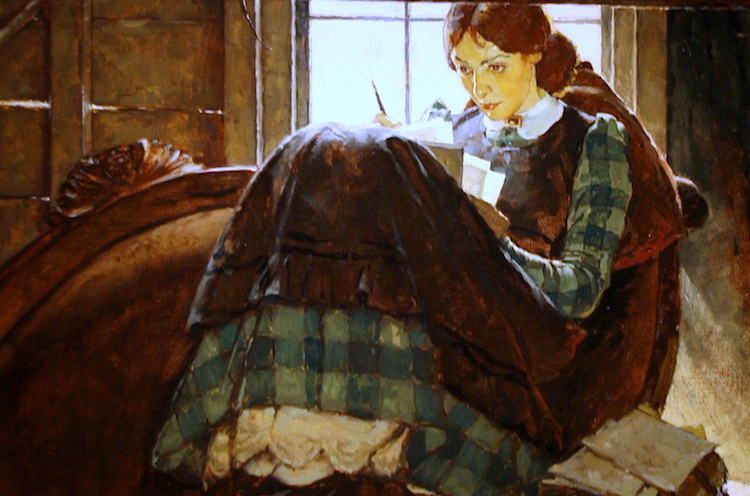
As a child I was often absolutely certain that as I was trying to fall asleep, some kind of monster I couldn’t place was in my room. I’d lie awake afraid, unable to discern the sound of my own breathing from his, or the rustle of my limbs between the sheets from his movements. Unable even to call out to anyone who might help me find my way through.
If I could just gather the courage to run across the room and switch on the light, I would find illuminated in the room a chair with all kinds of manageable things stacked on it—books and blankets and clothes and boots and toys. And if I really wanted to sleep soundly, I would have to put all those things away. I would have to lay them all out in the light, catalog them, and put them where they belonged. And in a few days, maybe a week, the chair would get stacked up again (perhaps I was an unusually messy child) and the process would start anew.
Our emotions can be like that unidentified, lurking monster. Writing—and art making in general—is like that run toward the switch on the wall. To write with honesty, I must first find the courage to turn on the light. I must risk exposing myself as I slip from under the covers of my ordinary life, the parts I play, and then deal with the difficult aftermath of seeing clearly what must be cleaned up—and figure out where things belong.
It is difficult, analog work. It is uncomfortable and exhausting. But it is also rewarding, and it gets easier as time passes. Having devoted myself to the practice of writing for some time, I’ve found that switching on the light becomes easier, more reflexive. I’ll notice the fog before the chair has piled up too high, sit up, turn on the light, and start the work of putting it away.
According to the research on writing and healing conducted over the last three decades, writing in a way that merges the chronological fact-based account with the subjective emotional experience for 20 minutes a day can have a significant impact on physical health—white blood cell counts go up, sick visits are fewer, blood pressures lower. Also, when you kick up dust inside yourself, when you make connections that you hadn’t made before, discover things about yourself that you hadn’t previously considered, you can feel like sh*t.
In Expressive Writing, a guide to writing in this way, Dr. James Pennebaker warns that lives are transformed by a regular writing regimen “…writing can be a significant threat. By reducing your inner conflicts, you may affect the course of your life and the lives of others in unintended ways.” It is in the book as an actual warning: If you look too closely you may not like what you see. If you look too closely, you may not like what you have to do to make things right. You may have to leave your husband, quit your job.
In the transition from passively experiencing emotion through actively arranging it into words and finally arriving at witnessing it upon completion, we are changed. We cannot go back to who we were. And that is scary, because I’m warm under the covers. Even if I’m stuck, I’m comfortable in some ways, have built up mechanisms to accommodate the particular sort of darkness I’m dealing with.
Each of us must do the work ourselves. No one else can do it for us. Socrates, Baldwin, Jamison, Rich, Rukeyser all write: An unexamined life is not worth living. Never does it become cliché; each of the lives they examine are singular. No one else’s examination will do. Even if the conclusions drawn are essentially the same ones that have been drawn by thoughtful people for centuries. Even if we ourselves have drawn these conclusions before, in a different skin. I am always learning and forgetting and relearning not to discount my own experience.
In the four years after leaving the institution of marriage, I discovered more about myself—good and bad—than I could ever have imagined. I was in the early stages of my writing, limping forward in spite of my attachment to the comforts of that life (safe under the covers) toward a self-questioning that would ultimately leave me excavated beneath the crust of myself, blasted open like a mine inside a mountain. For all I have said and have yet to say about the complexities of that marriage—our youth, my temper, his temper, his overwhelming and consuming love for me, my great but lesser love for him, our mutual devotion to our children—the fact most difficult to face is my inability to be truly pleased or satisfied by anything that the traditional institution of marriage was capable of giving me. He may have been mean or aggressive, controlling and unyielding. But I am selfish, restless, lustful. By which I mean: I am an artist, a writer. By which I mean: Becoming is my life’s work.
We must push back the covers and run toward the light, even if we don’t always like what we see.
~
Author: Seema Reza
Editor: Travis May
Image: Cliff/Flickr








Read 0 comments and reply